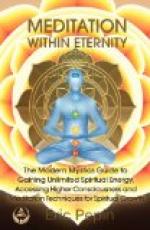The merely sense-conscious man is the man-animal; the abstractive man is the average man and woman in the world to-day—the human who is evolving out of the mental into the spiritual consciousness. The specialist is the cosmic conscious one, the one who “catches a glimpse of his destiny.”
Balzac, in company with all who attain cosmic consciousness, had a great capacity for suffering; and this soul-loneliness became crystalized into spiritual wisdom, which he expressed in the words and in the manner most likely to be accepted by the world.
How else can that divine union to which we are heirs and for which we are either blindly, consciously, or supra-consciously, striving, be described and exploited without danger of defilement and degeneracy, save and except by the phrase “unity with God”?
All mystics have found it necessary to veil the “secret of secrets,” lest the unworthy (because unready) defile it with his gaze, even as the sinful devotee prostrates himself hiding his face, while the priest raises the chalice containing the holy eucharist in the ceremony of the mass.
CHAPTER XIV
ILLUMINATION AS EXPRESSED IN THE POETICAL TEMPERAMENT
Poetry is the natural language of cosmic consciousness. “The music of the spheres” is a literal expression, as all who have ever glimpsed the beauties of the spiritual realms will testify.
“Poets are the trumpets which sing to battle. Poets are the unacknowledged legislators of the world,” said Shelley.
Not that all poets are aware, in their mortal consciousness, of their divine mission, or of their spiritual glimpses.
The outer mind, the mortal or carnal mind—that part of our organism whose office it is to take care of the physical body, for its preservation and its well-being, may be so dominant as, to hold in bondage the atman, but it can not utterly silence its voice.
Thus the true poet is also a seer; a prophet; a spiritually-conscious being, for such time, or during such phases of inspiration, as he becomes imbued with the spirit of poetry.
A person who writes rhymes is not necessarily a poet. So, too, there are poets who do not express their inspirations according to the rules of metre and syntax.
Between that which Balzac tabulated as the “abstractive” type of human evolvement and that which is fully cosmic in consciousness, there are many and diverse degrees of the higher faculties; but the poet always expresses some one of these degrees of the higher consciousness; indeed some poets are of that versatile nature that they run the entire gamut of the emotional nature, now descending to the ordinary normal consciousness which takes account only of the personal self; again ascending to the heights of the impersonal fearlessness and unassailable confidence that is the heritage of those who have reached the full stature of the “man-god whom we await”—the cosmic conscious race that is to be.




